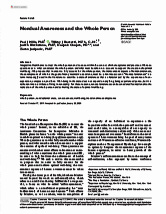 New Research Paper out now! Read the full paper here.
New Research Paper out now! Read the full paper here.
 New Research Paper out now! Read the full paper here.
New Research Paper out now! Read the full paper here.
New Research Paper out now! Read the full paper here.
By Deepak Chopra, MD, FACP, Rudolph E. Tanzi, PhD, Michelle Williams, ScD, Ryan Castle, William C. Bushell, PhD, Kimberly Brouwer, PhD, and Paul J. Mills, PhD
Although COVID-19 is very easily transmitted from person to person, the risk of subsequent hospitalization and death primarily affects people who are already at risk because of old age, infirmity and/or chronic diseases such as cancer, diabetes, autoimmune illness, obesity, and heart disease. All of these chronic illnesses are associated with measurable low-grade inflammation in the body. The chronic low-grade inflammation that develops with advanced age has become known as “inflammaging”. Most people with chronic illness unknowingly have low-grade inflammation. Recent research points to a second finding: these same disorders are often accompanied by persistent low-grade anxiety and depression.
All of this as a background increases the danger for a person when acute illness strikes. In addition to the elderly and chronically ill, COVID-19 is causing acute respiratory illness and stroke sometimes leading to death in seemingly otherwise healthy younger individuals. The transition from SARS-CoV-2 infection to diagnosed COVID-19 is typically accompanied by a “cytokine storm.” Cytokines are proteins that are major drivers of inflammation, and their rapid increase, or “storm” is one of the body’s immune responses to acute threat.
In addition, studies have connected pro-inflammatory cytokines to the stress response; they regulate well-known stress hormones such as ACTH and cortisol. Three major systems are involved: the immune system, the central nervous system and the endocrine hormone system.
In the face of these connections, we are coming forward to suggest that complementary practices—deep breathing, yoga, and meditation—can play an important role during this pandemic. These practices have been confirmed by hundreds of scientific studies to bring down over-activity of the autonomic nervous system, calm the mind from anxiety, reduce the stress response, regularize heartbeat, and lower blood pressure. Together, all of these diverse benefits are associated with reducing the invisible presence of chronic low-grade inflammation, especially if added to good sleep, exercise, and proper diet.
We don’t fully understand how the immune response, linked to stress and inflammation, can turn lethal. As a response to cuts, wounds, invading pathogens, and other threats, prior to antibody formation, the body first responds with inflammation as a normal yet crucial healing function. But it has long been known that inflammation is paradoxical. Acute inflammation can over-react, harming or even killing the patient. (Instances of strokes and heart attacks among young COVID-19 patients might be linked to micro-cytokine storms in the brain and heart.)
The threat from low-grade chronic inflammation was not discovered until recently but seems to be widespread. It is unaccompanied by the swelling, burning, and redness of the skin that marks acute inflammation and therefore goes undetected by the patient or physician. Preventing and addressing chronic low-grade inflammation and its significant adverse consequences are urgent issues, even more urgent during a pandemic. There seems to be every reason to make the public aware how deep breathing, meditation, yoga, and other healthy lifestyle practices can help during this crisis and long afterwards.
Eric Schadt discusses the Effects of Meditation at Sages and Scientists
We highly recommend giving the full article a read!
William C. Bushell, PhD, is the Director of Research & Academic Liaison of the Integrative Studies Historical Archive & Repository (ISHAR), an initiative of the Chopra Foundation.